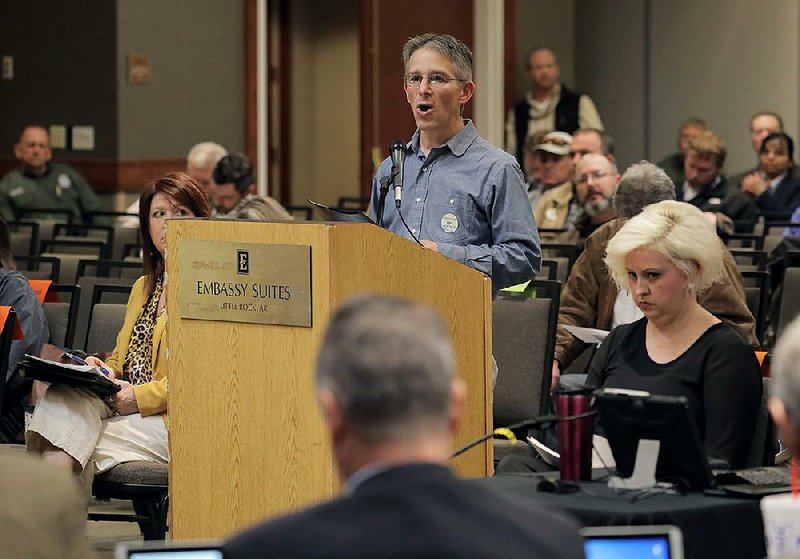The state Plant Board on Wednesday adopted a May 25 cutoff for farmers to spray dicamba next year but ditched two record-keeping proposals that critics said would be too expensive.
The 13-1 vote came during a public hearing that lasted about three hours and attracted about 80 people, about one-third the size of crowds that attended similar hearings the past two years.
Terry Fuller, a Plant Board member who represents the Arkansas Seed Growers Association, voted against the proposed regulation. He said it doesn't reflect public sentiment for an earlier cutoff date and that allowing farmers to spray deep into May will increase the likelihood of dicamba moving off plants after application and damaging nearby crops that aren't dicamba tolerant.
Many in the audience, as members of Audubon Arkansas, argued for an April 15 cutoff, to protect other crops and native vegetation. That essentially would limit dicamba's use to farmers' burndown period, or when fields are prepped before planting.
Farmers who want to use dicamba said they wanted a longer spraying season, at least deeper until June, when pigweed, now resistant to other herbicides, is threatening crop yields.
Franklin Fogleman, an east Arkansas farmer, told the board he spoke with 35 farmers on Tuesday and encouraged them to attend the hearing. None did, Fogleman said, citing "attrition, apathy and fatigue" on an issue that has divided farmers and, at times, the Plant Board since 2016.
This year's cutoff date also was May 25, yet the board received 210 complaints of dicamba damage. The board received 467 comments from the public during a 30-day comment period that ended Nov. 30.
Danny Townsend, a landscaper, said if he sprayed dicamba as part of his work and caused damage the Plant Board would shut him down. "I'd be out of business," he said, adding that Bayer and other dicamba manufacturers have a responsibility to put out a product that's less volatile than the dicamba formulations they have on the market now.
The board dropped two proposals some board members have said would strengthen their enforcement efforts.
One would have required farmers to outfit their spray rigs with a GPS device that would map the coordinates of any field where dicamba was to be applied and to keep a map of the applied field and make it available to state Department of Agriculture inspectors when asked. Another proposed rule required farmers to register their dicamba applications online with the agriculture department within 10 days after spraying.
Andrew Grobmyer, of the Arkansas Agriculture Council, said those proposals were too expensive and would duplicate other record-keeping requirements of both the Plant Board and the federal Environmental Protection Agency.
For next year's crop season, the board also retained buffers it required this season. They include a 1-mile buffer between dicamba-applied fields and agriculture research stations, crops that aren't dicamba tolerant, and specialty and organic crops.
The EPA in October 2018 said it would allow in-crop dicamba use through at least November 2020.
The Plant Board has wrestled with dicamba since 2016, when there were no dicamba formulations approved by the EPA for in-crop use on dicamba-tolerant soybeans and cotton.
Monsanto, now owned by Bayer, developed the dicamba-tolerant seeds and put them on the market in 2015 (cotton) and 2016 (soybeans), even though its XtendiMax dicamba was still being evaluated by the EPA.
Without an EPA-approved dicamba, some farmers in Arkansas and other states who planted the dicamba-tolerant crop systems also sprayed older, more volatile formulations of the herbicide. Other varieties of soybeans and cotton, as well as ornamental trees and shrubs and native vegetation, are susceptible to dicamba.
The Plant Board received 31 complaints in 2016, a crop year that reached its lowest point when an Arkansas farmer was shot and killed that harvest during a dispute over dicamba damage to his crops.
Complaints mounted to more than 1,000 in 2017, prompting a mid-season emergency ban on dicamba's use. The board received about 200 complaints in 2018.
The regulations adopted Wednesday now go to the governor and lawmakers for consideration.
Business on 12/12/2019
